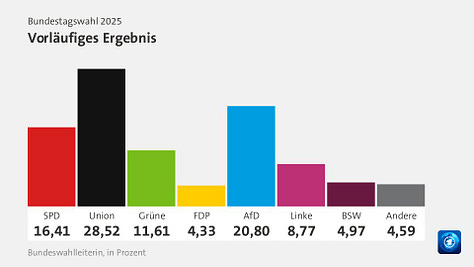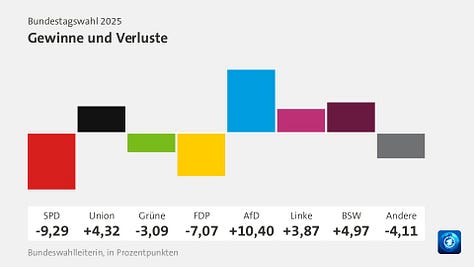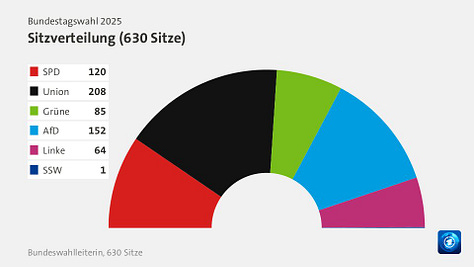The democratic centre has lost.
On the German federal elections and why not only the coalition parties are the losers but the whole democratic centre.



It’s the day after the German federal elecitons and after a lot of waiting, we finally know that FDP (Liberals) and BSW (left conservatism/left populism) didn’t make it past 5% and therefore failed to make it into parliament. The right-wing AfD doubled their result from 2021 and is the biggest winner of the night - together with The Left who were declared politically dead just until a few weeks ago. They are especially popular among young voters, representing the most successful party for the under 24 year olds with 25% (followed by the AfD with 21%). Kickstarter to their comeback was CDU/CSU and FDP voting together with AfD for harsher migration policies. It was the first time in Germany’s post war history that democratic parties voted with right-extremists.
The conservatives have won but didn’t achieve their goal of at least 30%. Considering how unpopular the old coalition used to be they expected results upwards of that 30% mark. Still, Friedrich Merz, leader of the CDU, will become Germany’s next chancellor. There is also no talking past the fact that the Social Democrats are the biggest losers. Chancellor Olaf Scholz will disappear from big political stage and will also not take part in a future “Great Coalition” (CDU/CSU & SPD) - which doesn’t even have 50% of the votes anymore. Instead Boris Pistorius, current minister of defence, will probably play the leading role for the SPD in the coalition talks.
No trust in the democratic centre
The Social Democrats have officially lost their status as a party for the working class. Instead they are now third place in that voting bloc - behind conservatives and by far behind the right-wing AfD. The same goes for people in financially bad situations. The coalition parties of SPD, Greens and FDP have all failed these voters.


Not only did the democratic centre fail among those voter groups but they also miserably failed in eastern Germany. In Thuringia 38.6% voted for the AfD, 15.2 for the Left and 9.4% for the BSW. Combined only (!) 34.4% voted for CDU, SPD, Greens and FDP. In Saxony the results are similar. Those results are worrying and scary. More than half of the voters in Eastern Germany seem to have lost trust in the “established” parties and many consciously vote for right-extremists. But a lot of voters from AfD and BSW can be won back to democratic parties as a good portion of their voters are still “protest-voters”. Generally speaking, I feel like the rift between western and eastern Germany just gets bigger and bigger.
What needs to be said is that we now got confirmed that copying AfD position won’t make them weaker but instead stronger. Even though the CDU/CSU totally gained, they lost more than one million voters to the AfD. The SPD on the other side “only” lost 720k voters to the far right and lost the most to the conservatives (1.7 million voters). Also the FDP - who copied a lot of the language of the AfD and were involved in voting together with the AfD - lost almost 900k voters to the AfD.
No 2/3 majority
The toughest bit for the upcoming legislative period will probably be the fact that the remaining centre of CDU/CSU, SPD and Greens don’t have a two-thirds-majority. This will make it very tough, if not impossible to change the constitution (depending on the topic, the Left might cooperate). The debt-brake is written in the constitution and will play a crucial role in the upcoming period, considering the current economic crisis and lack of budget for our security. While the Left generally opposes the debt-brake, they oppose even more an increase in military spending which will be a crucial reasoning in touching the debt-brake. I think that Friedrich Merz underestimated the role of the debt-brake before the election and will experience a very tough time if the Left isn’t to be convinced to join a change of the rule.
Focusing on now, I agree with Friedrich Merz that coalition talks have to be fast and we should have a new government latest on Easter (20th April). Germany can’t have a longer time of insecurities and uncertainness. But even more importantly, Europe can’t wait for ever. We need a strong Germany for a strong Europe to secure our freedom and peace. I also do appreciate Friedrich Merz calling for more independence of Europe from the US and that Europe should be unified and act as one. Time will tell how the coalition talks will end and what Friedrich Merz will be able to deliver, especially in migration and economic policies. Factually, he and his coalition will have to deliver or we might witness an even worse result for the democratic centrists in 2029. We could end up with Austrian circumstances where the far-right become the strongest party if the centre isn’t able to solve real problems. But I am optimistic that our society and politics are conscious of that and will be able to counter steer. German Antifascism is strong.
P.S.: One good thing is the increase in voter turnout from 76.6% in 2021 to 82.5% in 2025. It’s the highest voter turnout since the German reunification and it’s very good to see that when Germans get disappointed with politics they don’t resolve to not voting.




